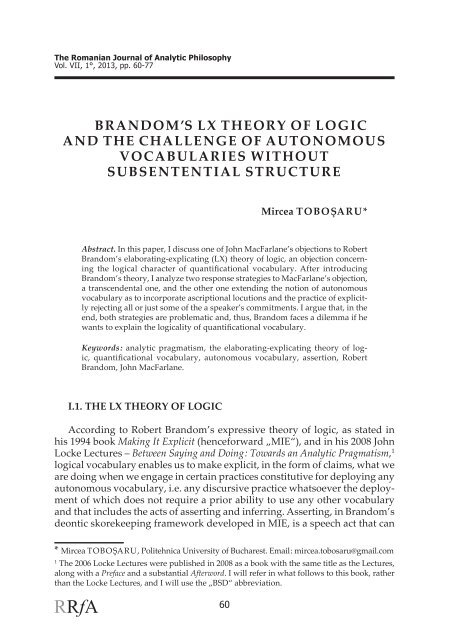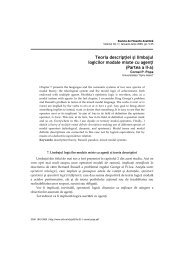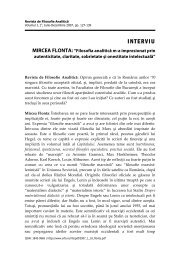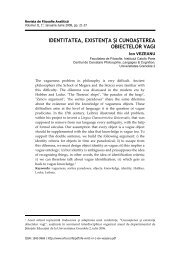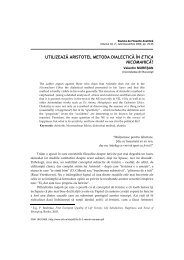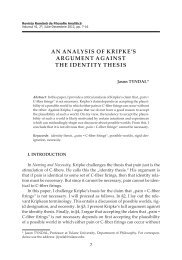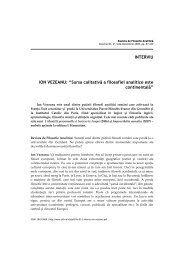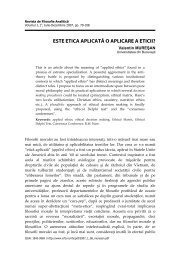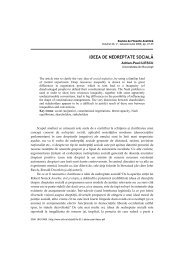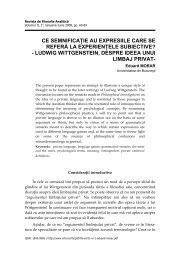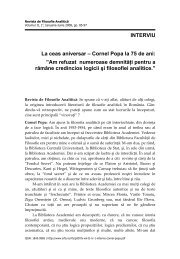brandom's lx theory of logic and the challenge of autonomous ...
brandom's lx theory of logic and the challenge of autonomous ...
brandom's lx theory of logic and the challenge of autonomous ...
You also want an ePaper? Increase the reach of your titles
YUMPU automatically turns print PDFs into web optimized ePapers that Google loves.
The Romanian Journal <strong>of</strong> Analytic Philosophy<br />
Vol. VII, 1°, 2013, pp. 60-77<br />
BRANDOM’S LX THEORY OF LOGIC<br />
AND THE CHALLENGE OF AUTONOMOUS<br />
VOCABULARIES WITHOUT<br />
SUBSENTENTIAL STRUCTURE<br />
Mircea TOBOȘARU*<br />
Abstract. In this paper, I discuss one <strong>of</strong> John MacFarlane’s objections to Robert<br />
Br<strong>and</strong>om’s elaborating-explicating (LX) <strong><strong>the</strong>ory</strong> <strong>of</strong> <strong>logic</strong>, an objection concerning<br />
<strong>the</strong> <strong>logic</strong>al character <strong>of</strong> quantificational vocabulary. After introducing<br />
Br<strong>and</strong>om’s <strong><strong>the</strong>ory</strong>, I analyze two response strategies to MacFarlane’s objection,<br />
a transcendental one, <strong>and</strong> <strong>the</strong> o<strong>the</strong>r one extending <strong>the</strong> notion <strong>of</strong> <strong>autonomous</strong><br />
vocabulary as to incorporate ascriptional locutions <strong>and</strong> <strong>the</strong> practice <strong>of</strong> explicitly<br />
rejecting all or just some <strong>of</strong> <strong>the</strong> a speaker’s commitments. I argue that, in <strong>the</strong><br />
end, both strategies are problematic <strong>and</strong>, thus, Br<strong>and</strong>om faces a dilemma if he<br />
wants to explain <strong>the</strong> <strong>logic</strong>ality <strong>of</strong> quantificational vocabulary.<br />
Keywords : analytic pragmatism, <strong>the</strong> elaborating-explicating <strong><strong>the</strong>ory</strong> <strong>of</strong> <strong>logic</strong>,<br />
quantificational vocabulary, <strong>autonomous</strong> vocabulary, assertion, Robert<br />
Br<strong>and</strong>om, John MacFarlane.<br />
I.1. THE LX THEORY OF LOGIC<br />
According to Robert Br<strong>and</strong>om’s expressive <strong><strong>the</strong>ory</strong> <strong>of</strong> <strong>logic</strong>, as stated in<br />
his 1994 book Making It Explicit (henceforward „MIE“), <strong>and</strong> in his 2008 John<br />
Locke Lectures – Between Saying <strong>and</strong> Doing : Towards an Analytic Pragmatism, 1<br />
<strong>logic</strong>al vocabulary enables us to make explicit, in <strong>the</strong> form <strong>of</strong> claims, what we<br />
are doing when we engage in certain practices constitutive for deploying any<br />
<strong>autonomous</strong> vocabulary, i.e. any discursive practice whatsoever <strong>the</strong> deployment<br />
<strong>of</strong> which does not require a prior ability to use any o<strong>the</strong>r vocabulary<br />
<strong>and</strong> that includes <strong>the</strong> acts <strong>of</strong> asserting <strong>and</strong> inferring. Asserting, in Br<strong>and</strong>om’s<br />
deontic skorekeeping framework developed in MIE, is a speech act that can<br />
* Mircea TOBOȘARU, Politehnica University <strong>of</strong> Bucharest. Email : mircea.tobosaru@gmail.com<br />
1<br />
The 2006 Locke Lectures were published in 2008 as a book with <strong>the</strong> same title as <strong>the</strong> Lectures,<br />
along with a Preface <strong>and</strong> a substantial Afterword. I will refer in what follows to this book, ra<strong>the</strong>r<br />
than <strong>the</strong> Locke Lectures, <strong>and</strong> I will use <strong>the</strong> „BSD“ abbreviation.<br />
60
Br<strong>and</strong>om’s Lx Theory <strong>of</strong> Logic <strong>and</strong> <strong>the</strong> Challenge <strong>of</strong> Autonomous Vocabularies...<br />
be defined in a deontic functionalist manner as follows : A is an assertion if<br />
<strong>the</strong> scorekeepers <strong>of</strong> <strong>the</strong> language game treat <strong>the</strong> speaker uttering A as undertaking<br />
a commitment C, as committed to <strong>the</strong> related set <strong>of</strong> commitments {C’},<br />
as prima facie entitled to C <strong>and</strong> {C’}, <strong>and</strong> as undertaking <strong>the</strong> responsibility<br />
to provide reasons for C when <strong>challenge</strong>d by any o<strong>the</strong>r speaker. 2 Inferring,<br />
in turn, is a language move consisting <strong>of</strong> a particular transition from one deontic<br />
status to ano<strong>the</strong>r : from commitment to commitment (i.e. commitment<br />
entailment relation), from entitlement to entitlement (i.e. entitlement entailment<br />
relation), or from one commitment to <strong>the</strong> deontic status <strong>of</strong> not–being–<br />
entitled-to (i.e. incompatibility entailment relation). The conditional, for example,<br />
is a paradigmatic <strong>logic</strong>al expression because it lets us make explicit<br />
<strong>the</strong> material inferences constitutive for discursive practice. Using <strong>the</strong> expression<br />
„If…, <strong>the</strong>n…“ we can state what <strong>the</strong> consequences <strong>of</strong> assertions are, <strong>and</strong><br />
in this way, we can examine, <strong>challenge</strong>, <strong>and</strong> modify all material inferences<br />
that make <strong>the</strong> conceptual network <strong>of</strong> any language. According to Br<strong>and</strong>om’s<br />
layer-cake picture <strong>of</strong> sapience, one need not master <strong>logic</strong>al locutions in order<br />
to count as a (rational) speaker <strong>of</strong> a language. 3 However, <strong>logic</strong>al vocabulary<br />
is not <strong>autonomous</strong> : in order to learn how to use <strong>logic</strong>al expressions one<br />
needs, first, to learn how to use non-<strong>logic</strong>al vocabulary. Logical vocabulary<br />
allows rational beings that master <strong>the</strong> game <strong>of</strong> giving <strong>and</strong> asking for reasons<br />
involving only non-<strong>logic</strong>al vocabulary to become semantically self-aware by<br />
making explicit <strong>the</strong> meaning-constitutive inferential network.<br />
The process <strong>of</strong> learning to use <strong>logic</strong>al locutions, Br<strong>and</strong>om claims, can be<br />
rigorously described using <strong>the</strong> conceptual resources <strong>of</strong> analytic pragmatism,<br />
more precisely his <strong><strong>the</strong>ory</strong> <strong>of</strong> practical elaboration. Analytic pragmatism is a<br />
philosophy <strong>of</strong> language project born from an effort to clarify, using a special<br />
metaconceptual apparatus, some general commitments regarding <strong>the</strong> relations<br />
between practices or abilities (pragmatics) <strong>and</strong> vocabularies (semantics) that<br />
were first developed in MIE (BSD, 234). The basic relations are <strong>the</strong> following. A<br />
vocabulary is VP-necessary for some practices just in case we cannot <strong>the</strong>oretically<br />
specify (i.e. describe <strong>and</strong> explain) <strong>the</strong>se practices without it ; if <strong>the</strong> vocabulary<br />
permits us to fully specify some set <strong>of</strong> practices, <strong>the</strong>n it is VP-sufficient.<br />
Some practices, in turn, are PP-necessary for o<strong>the</strong>r practices if it impossible for<br />
someone to do something unless he is able to engage in some o<strong>the</strong>r practices<br />
(e.g. knowing how to subtract is PP-necessary for knowing how to divide).<br />
If engaging successfully in some set <strong>of</strong> practices is enough for someone to be<br />
able, in principle, to engage in o<strong>the</strong>r set <strong>of</strong> practices, <strong>the</strong>n <strong>the</strong> first set <strong>of</strong> practices<br />
is PP-sufficient for <strong>the</strong> second. If engaging in some practices is enough for<br />
2<br />
Br<strong>and</strong>om’s account <strong>of</strong> assertion is influenced by David Lewis’ suggestion that we can underst<strong>and</strong><br />
speech acts relative to how <strong>the</strong>y change <strong>the</strong> „conversational score“ (1979). According to<br />
John MacFarlane (2011, p. 17), <strong>the</strong> tradition <strong>of</strong> conceiving assertion as a kind <strong>of</strong> commitment<br />
„has its roots in Peirce, who said that ‘to assert a proposition is to make oneself responsible for<br />
its truth’ (Peirce 1934, p. 384).“<br />
3<br />
„There is nothing incoherent about a language or stage in <strong>the</strong> development <strong>of</strong> a language in<br />
which <strong>the</strong> only vocabulary in play is non<strong>logic</strong>al.“ (MIE, 384 ; cf. Br<strong>and</strong>om 2002, pp. 328-329)<br />
61
Mircea Toboșaru<br />
someone to count as saying something, <strong>the</strong>n we have a PV-sufficiency relation ;<br />
if someone doesn’t count as saying something unless he or she knows how to<br />
do something, <strong>the</strong>n some practices or abilities are PV-necessary. Finally, if we<br />
can say in one vocabulary everything we were able to say using ano<strong>the</strong>r vocabulary,<br />
it follows that <strong>the</strong> first vocabulary is VV-sufficient for <strong>the</strong> second ; if<br />
we can’t express something implicit in one vocabulary unless we use ano<strong>the</strong>r<br />
vocabulary, <strong>the</strong>n <strong>the</strong> second vocabulary is VV-necessary for <strong>the</strong> first. Br<strong>and</strong>om<br />
claims that this <strong>the</strong>oretical apparatus „recursively generates an infinite set <strong>of</strong><br />
such pragmatically mediated semantic relations“ (BSD, 11). Composing <strong>the</strong>se<br />
basic relations we arrive at complex ones : <strong>the</strong> relation <strong>of</strong> being a pragmatic<br />
metavocabulary for ano<strong>the</strong>r, <strong>the</strong> relation <strong>of</strong> semantic presupposition, <strong>the</strong> relation<br />
<strong>of</strong> one vocabulary being universally LX etc. 4<br />
Because <strong>of</strong> <strong>the</strong> self-reflecting <strong>the</strong>oretic strategy, <strong>the</strong> expressive <strong><strong>the</strong>ory</strong> <strong>of</strong><br />
<strong>logic</strong> developed in MIE (labeled „<strong>the</strong> elaborating-explicating (LX) <strong><strong>the</strong>ory</strong> <strong>of</strong><br />
<strong>logic</strong>“ throughout BSD), gains clarity <strong>and</strong> precision when reframed in BSD’s<br />
analytic pragmatism idiom. Focusing again on <strong>the</strong> conditional, <strong>the</strong> LX <strong><strong>the</strong>ory</strong><br />
tells us that learning to use <strong>the</strong> conditional is a process whereby we elaborate<br />
basic practices or abilities necessary for any discursive activity, in this<br />
case <strong>the</strong> practice <strong>of</strong> inferring (<strong>and</strong> sorting good from bad material inferences),<br />
into complex ones that are explicating <strong>the</strong> basic practices. This process<br />
<strong>of</strong> practical elaboration can be algorithmically specified by showing how <strong>the</strong><br />
simple practices are composed into complex ones using three meta-abilities,<br />
namely response substitution, arbitrary state-formation, <strong>and</strong> state-permutation.<br />
5 Meta-abilities implement PP-sufficiency relations that result „when<br />
<strong>the</strong> capacity to engage in one sort <strong>of</strong> practice or to exercise one sort <strong>of</strong> ability<br />
is in principle sufficient for <strong>the</strong> capacity to engage in o<strong>the</strong>r practices or to exercise<br />
o<strong>the</strong>r abilities“ (BSD, 33). Thus, algorithmic elaboration is supposed<br />
to explain how basic doings are combined in <strong>the</strong> elaboration <strong>of</strong> different vocabularies.<br />
The pragmatic explanation parallels Gentzen’s method <strong>of</strong> specifying<br />
introduction <strong>and</strong> elimination rules for <strong>logic</strong>al expressions. In <strong>the</strong> case<br />
<strong>of</strong> <strong>the</strong> conditional, Br<strong>and</strong>om gives <strong>the</strong> following analysis :<br />
„By hypo<strong>the</strong>sis, <strong>the</strong> system has <strong>the</strong> ability to respond differentially to<br />
<strong>the</strong> inference from p to q by accepting or rejecting it. It also must have<br />
<strong>the</strong> ability to produce tokenings <strong>of</strong> p <strong>and</strong> q in <strong>the</strong> form <strong>of</strong> assertings. We<br />
assume that since it can produce those assertions, we can teach it also<br />
4<br />
Complex meaning-use (or pragmatically mediated semantic) relations result by applying<br />
some operations specific to category <strong><strong>the</strong>ory</strong>. The first such relation, for example, is that <strong>of</strong> being<br />
a pragmatic metavocabulary : V1 is a pragmatic metavocabulary for V2 if V1 is VP-sufficient for<br />
specifying <strong>the</strong> practices P2 that are PV-sufficient for deploying V1.<br />
5<br />
A system that has <strong>the</strong> response substitution meta-ability can substitute a response r1 to a stimulus<br />
s1 with ano<strong>the</strong>r response r2 that is linked initially with ano<strong>the</strong>r stimulus s2, forming a<br />
new system state. According to arbitrary state-formation, if a system in disposed to respond<br />
to a stimulus s1 with <strong>the</strong> response s1, <strong>and</strong> to <strong>the</strong> stimulus s2 with <strong>the</strong> response r2, <strong>the</strong>n it can<br />
be made to enter a new state where it responds to s1 with r1 <strong>and</strong> to s2 with r2. Finally, if a system<br />
has <strong>the</strong> state permutation meta-ability, <strong>the</strong>n it can respond to any stimulus by changing <strong>the</strong><br />
state <strong>the</strong> system is in (see BSD, 38).<br />
62
Br<strong>and</strong>om’s Lx Theory <strong>of</strong> Logic <strong>and</strong> <strong>the</strong> Challenge <strong>of</strong> Autonomous Vocabularies...<br />
to produce assertively tokenings <strong>of</strong> <strong>the</strong> new form „if p <strong>the</strong>n q.“ What is<br />
required, <strong>the</strong>n, is first that this new sort <strong>of</strong> response be hooked up responsively<br />
to <strong>the</strong> previously discriminable stimulus, so that it is asserted<br />
just in those cases where <strong>the</strong> inference from p to q would have been<br />
responded to as a good one. […] For <strong>the</strong> consequences <strong>of</strong> application,<br />
we need ano<strong>the</strong>r bit <strong>of</strong> response substitution. The system can already, by<br />
hypo<strong>the</strong>sis, respond to some stimuli by treating an inference as good or<br />
bad. We must now hook up that response to a new stimulus-kind. The<br />
system must respond to its assertion <strong>of</strong> <strong>the</strong> conditional «if p <strong>the</strong>n q» by<br />
treating <strong>the</strong> inference from p to q as a good one—for instance, by being<br />
disposed to endorse q assertionally if it is disposed to endorse p assertionally.<br />
These new differential responsive abilities, achieved by reshuffling<br />
prior ones, <strong>the</strong>n settle <strong>the</strong> statetable that specifies how <strong>the</strong> system<br />
is able to respond to different presented stimuli : non-<strong>logic</strong>al sentences<br />
<strong>and</strong> inferences involving <strong>the</strong>m, <strong>and</strong> now also conditional sentences <strong>and</strong><br />
inferences involving <strong>the</strong>m— paradigmatically, modus ponens. In a clear<br />
sense, <strong>the</strong>n, <strong>the</strong> capacity to distinguish good from bad inferences involving<br />
non-<strong>logic</strong>al sentences is (PP-) sufficient for <strong>the</strong> ability to deploy conditionals<br />
involving those sentences.“ (BSD, 45) 6<br />
Such relations can be diagrammatically represented, in <strong>the</strong> case <strong>of</strong> <strong>the</strong> conditional<br />
vocabulary, as follows :<br />
V conditionals<br />
Res 1<br />
: VV 1-5<br />
V 1<br />
4 : PV-suff<br />
5 : VP-suff<br />
1 : PV-suff<br />
2 : PV-nec<br />
P conditionals<br />
P AlgEl 3 : PP-suff<br />
P inferring<br />
P ADP<br />
Fig. 1. Elaborated-explicating (LX) conditionals 7<br />
6<br />
Something is missing from this analysis. When accepting S’s move from p to q, I can be in one<br />
<strong>of</strong> <strong>the</strong> two situations : on <strong>the</strong> one h<strong>and</strong>, I can be also committed to p ; on <strong>the</strong> o<strong>the</strong>r h<strong>and</strong> I might<br />
reject p because, for example, p is incompatible with r, for which I have an entitlement. If I am<br />
committed to p, I will say „p, <strong>the</strong>n q.“ This formulation is appropriate because in this way I<br />
make explicit <strong>the</strong> fact that I am committed to p. The use <strong>of</strong> <strong>the</strong> conditional locution „<strong>the</strong>n,“ in addition,<br />
makes explicit <strong>the</strong> semantic connection between p <strong>and</strong> q. In <strong>the</strong> second case, what I want<br />
to do is to express <strong>the</strong> semantic connection from p to q, but not necessarily <strong>the</strong> fact that I am committed<br />
to p. This shows that besides acceptance <strong>and</strong> rejection, ano<strong>the</strong>r attitude is needed, one<br />
that be <strong>the</strong> right target in order to attach <strong>the</strong> response „If p, <strong>the</strong>n q.“ Lance <strong>and</strong> White (2007) calls<br />
such a speech act „hypo<strong>the</strong>sizing,“ <strong>and</strong> argue that is essential in attributing intentional states.<br />
7<br />
Diagram taken from BSD, 46. Given <strong>the</strong> resultant relation 5, <strong>the</strong> conditional vocabulary is a<br />
pragmatic metavocabulary for <strong>the</strong> inferential practice.<br />
63
Mircea Toboșaru<br />
In contrast to <strong>the</strong> conditional, an expression like „X promises…“ makes<br />
explicit a practical commitment one undertakes, but it is not a <strong>logic</strong>al expression<br />
in a strict sense because <strong>the</strong>re could be <strong>autonomous</strong> discursive practices<br />
(ADPs) that do not include <strong>the</strong> practice <strong>of</strong> promising. Thus, promising is<br />
not a constitutive speech act for discursive practices. 8<br />
Logical vocabulary is a species <strong>of</strong> universal elaborating-explicating vocabularies<br />
: elaborating vocabulary because it can be introduced in a discursive<br />
practice by algorithmically elaborating simple practices into complex<br />
through meta-abilities ; explicating vocabulary because it makes explicit <strong>the</strong><br />
proprieties <strong>of</strong> <strong>the</strong> simpler implicit practices used in <strong>the</strong> process <strong>of</strong> elaboration<br />
; <strong>and</strong> universal because <strong>the</strong>se practices are essential for any au<strong>the</strong>ntic discursive<br />
practice. In Br<strong>and</strong>om’s own words, ordinary <strong>logic</strong>al vocabulary is a<br />
species <strong>of</strong> a genus that is distinguished by three features :<br />
1. being deployed by practices-or-abilities that are algorithmically elaborated<br />
from<br />
2. practices-or-abilities that are PV-necessary for every <strong>autonomous</strong> vocabulary<br />
(<strong>and</strong> hence every vocabulary whatsoever) <strong>and</strong> that<br />
3. suffice to specify explicitly those PV-necessary practices-or-abilities.<br />
(BSD, 47)<br />
The first <strong>and</strong> <strong>the</strong> second requirements are <strong>the</strong> L part <strong>of</strong> <strong>the</strong> LX <strong><strong>the</strong>ory</strong> <strong>of</strong><br />
<strong>logic</strong>, <strong>the</strong> third one being <strong>the</strong> X part. Logical vocabulary is not to be identified<br />
in BSD with this genus, given that <strong>the</strong>re are also vocabularies that have<br />
<strong>the</strong> three characteristics mentioned above, but are not commonly viewed as<br />
<strong>logic</strong>al, e.g. <strong>the</strong> vocabulary <strong>of</strong> propositional attitudes or <strong>the</strong> normative vocabulary<br />
(containing also locutions such as „commitment,“ „entitlement“ etc.).<br />
Classical <strong>logic</strong>al expressions, on <strong>the</strong> one h<strong>and</strong>, according to Br<strong>and</strong>om, make<br />
explicit semantic proprieties. Ascriptional locutions or normative vocabulary,<br />
on <strong>the</strong> o<strong>the</strong>r h<strong>and</strong>, make explicit pragmatic features <strong>of</strong> <strong>the</strong> assertional-inferential<br />
practice (MIE, 530 ; Br<strong>and</strong>om 2008b, 140).<br />
I.2. MOTIVATING THE LX ACCOUNT OF LOGICAL<br />
VOCABULARY<br />
Although <strong>the</strong> pragmatic expressive approach to demarcating <strong>logic</strong> is not<br />
something new in <strong>the</strong> philosophy <strong>of</strong> <strong>logic</strong>, <strong>the</strong> LX <strong><strong>the</strong>ory</strong> is important because<br />
it is framed using, <strong>and</strong> deepened by, <strong>the</strong> analytic pragmatist meta-conceptual<br />
apparatus. This apparatus allows us to speak in a very precise manner about<br />
key features <strong>of</strong> <strong>logic</strong>al expressions, like universality, analytic efficiency, <strong>and</strong><br />
transparency. The last two features are essential in motivating <strong>the</strong> development<br />
<strong>of</strong> <strong>the</strong> LX <strong><strong>the</strong>ory</strong> <strong>of</strong> <strong>logic</strong> in BSD. According to Br<strong>and</strong>om, <strong>the</strong> LX <strong><strong>the</strong>ory</strong><br />
has <strong>the</strong> merit that it solves what he takes to be „<strong>the</strong> <strong>logic</strong>ist’s dilemma“<br />
<strong>and</strong> thus it validates <strong>the</strong> central role <strong>logic</strong>al vocabulary plays in <strong>the</strong> classical<br />
analytic project, a role expressed in <strong>the</strong> <strong>the</strong>oretical commitment to semantic<br />
8<br />
For o<strong>the</strong>r examples <strong>and</strong> a discussion <strong>of</strong> this point, see W<strong>and</strong>ered 2008, ch. 3.<br />
64
Br<strong>and</strong>om’s Lx Theory <strong>of</strong> Logic <strong>and</strong> <strong>the</strong> Challenge <strong>of</strong> Autonomous Vocabularies...<br />
<strong>logic</strong>ism (<strong>the</strong> view that <strong>logic</strong>al vocabulary is a legitimate auxiliary vocabulary<br />
in <strong>the</strong> process <strong>of</strong> semantic analysis). The dilemma is built around to opposing<br />
requirements that <strong>the</strong> auxiliary vocabulary has to satisfy <strong>the</strong> classical<br />
analytic project. First, it has to be semantically transparent : auxiliary vocabulary<br />
should not add semantic content to <strong>the</strong> process <strong>of</strong> semantic analysis. 9 If it<br />
were to do that, <strong>the</strong>n <strong>the</strong> claim that <strong>the</strong> target vocabulary is contained in <strong>the</strong><br />
base vocabulary would be compromised. According to <strong>the</strong> second requirement,<br />
<strong>logic</strong>al vocabulary must be analytically efficacious, i.e. it must make<br />
possible <strong>the</strong> elaboration, or construction, <strong>of</strong> <strong>the</strong> target vocabulary from <strong>the</strong><br />
meanings available in <strong>the</strong> base vocabulary.<br />
Br<strong>and</strong>om’s focus on <strong>the</strong> <strong>logic</strong>ist’s dilemma derives from his claim that an<br />
account <strong>of</strong> <strong>logic</strong>al vocabulary should not focus only on <strong>the</strong> „<strong>the</strong> circumstances<br />
<strong>of</strong> appropriate application <strong>of</strong> <strong>the</strong> term ‘<strong>logic</strong>al vocabulary’,“ (<strong>the</strong> necessary<br />
<strong>and</strong> sufficient conditions), but also on <strong>the</strong> „consequences <strong>of</strong> application being<br />
associated with <strong>the</strong> expression at issue.“ (BSD, 48) What are, asks Br<strong>and</strong>om,<br />
<strong>the</strong> implications <strong>of</strong> defining <strong>logic</strong> in this or that way ? His ra<strong>the</strong>r non-orthodox<br />
claim is that some consequences might be so important that it might determine<br />
our choice between several sets <strong>of</strong> conceptions <strong>of</strong> <strong>the</strong> role <strong>of</strong> <strong>logic</strong>al<br />
vocabulary :<br />
The demarcational question can sensibly be addressed only if we<br />
address also <strong>the</strong> (at least co-ordinate, perhaps even prior) question<br />
concerning <strong>the</strong> <strong>the</strong>oretical, explanatory, argumentative, or constructive<br />
role <strong>logic</strong> or <strong>logic</strong>al vocabulary is being envisaged as playing in<br />
some larger philosophical enterprise. (BSD, 48)<br />
Thus, Br<strong>and</strong>om’s concern is to investigate <strong>the</strong> consequences <strong>of</strong> <strong>the</strong> LX <strong><strong>the</strong>ory</strong><br />
<strong>of</strong> <strong>logic</strong> in <strong>the</strong> context <strong>of</strong> <strong>the</strong> classical analytic project <strong>and</strong>, more precisely,<br />
9<br />
Formality is usually thought <strong>of</strong> as satisfying this requirement. However, Br<strong>and</strong>om argues that<br />
<strong>the</strong>re are no adequate ways <strong>of</strong> distinguishing <strong>the</strong> form from <strong>the</strong> content. One <strong>of</strong> <strong>the</strong> best strategies<br />
seems to be <strong>the</strong> Frege-Bolzano identification <strong>of</strong> formality with semantic invariance under<br />
substitution. But it turns out that this criterion ra<strong>the</strong>r presupposes a prior criterion <strong>of</strong> demarcating<br />
<strong>logic</strong>al vocabulary. This is because „we can pick any vocabulary we like to privilege<br />
substitutionally : an inference is good <strong>and</strong> a claim true in virtue <strong>of</strong> its <strong>the</strong>o<strong>logic</strong>al or geo<strong>logic</strong>al<br />
form just in case it is good or true <strong>and</strong> remains so under all substitutions <strong>of</strong> non-<strong>the</strong>o<strong>logic</strong>al for<br />
non-<strong>the</strong>o<strong>logic</strong>al vocabulary, or non-geo<strong>logic</strong>al for non-geo<strong>logic</strong>al vocabulary. Theo<strong>logic</strong>al <strong>and</strong><br />
geo<strong>logic</strong>al formality will not just depend upon, but will express an important aspect <strong>of</strong>, <strong>the</strong> content<br />
<strong>of</strong> <strong>the</strong>o<strong>logic</strong>al <strong>and</strong> geo<strong>logic</strong>al concepts.“ (BSD, 51) Br<strong>and</strong>om’s <strong><strong>the</strong>ory</strong> <strong>of</strong> <strong>logic</strong> does not assume<br />
formality, but still has <strong>the</strong> resources for accounting for semantic transparency. This is because<br />
<strong>the</strong> content <strong>of</strong> <strong>logic</strong>al terms is a function <strong>of</strong> practices that are to be found (PV-necessity<br />
claim) in all vocabularies. Hence, when proceeding with an semantic analysis, we use something<br />
that is not added as something extrinsic to base <strong>and</strong> target vocabularies, but is intrinsic<br />
to <strong>the</strong> two vocabularies : „The capacity to deploy <strong>logic</strong>al vocabulary (or any universally<br />
LX-vocabulary) is in this sense always already implicit in <strong>the</strong> capacity to deploy any vocabulary<br />
at all that might be chosen to serve as <strong>the</strong> base vocabulary <strong>of</strong> a semantic analysis or explication<br />
<strong>of</strong> any target vocabulary (whe<strong>the</strong>r those appropriate to empiricist, naturalist, functionalist,<br />
or any o<strong>the</strong>r sort <strong>of</strong> analysis).“ (BSD, 53)<br />
65
Mircea Toboșaru<br />
on <strong>the</strong> central question Why <strong>logic</strong>al vocabulary is regarded as <strong>the</strong> legitimate<br />
tool <strong>of</strong> semantic translation, one that is never <strong>the</strong> target <strong>of</strong> semantic elaboration,<br />
but that makes possible any semantic analysis ? This question is implicit<br />
in <strong>the</strong> <strong>logic</strong>ist’s problem. Br<strong>and</strong>om’s claim is that being an universally<br />
LX-vocabulary is at least sufficient (<strong>and</strong> maybe necessary) for playing <strong>the</strong><br />
legitimate role that auxiliary vocabulary plays in <strong>the</strong> analytic project <strong>of</strong> semantic<br />
translation. The transparency requirement present in <strong>the</strong> formulation<br />
<strong>of</strong> <strong>the</strong> dilemma is satisfied, it turns out, because <strong>logic</strong>al vocabulary is elaborated<br />
from inferential practices universal PV-necessary. This represents <strong>the</strong><br />
elaborative dimension <strong>of</strong> <strong>logic</strong> vocabulary. Thus, <strong>the</strong>se practices are implicit<br />
in any target <strong>of</strong> <strong>the</strong> analytic process. In turn, <strong>the</strong> analytic efficacy requirement<br />
is satisfied because, according to Br<strong>and</strong>om, <strong>logic</strong>al vocabulary has an<br />
expressive function. 10<br />
According to MacFarlane, <strong>the</strong> LX <strong><strong>the</strong>ory</strong>’s is important because it contains<br />
an „argument that <strong>the</strong>se basic abilities [used in <strong>the</strong> process <strong>of</strong> algorithmic<br />
elaboration <strong>of</strong> <strong>logic</strong>al locutions] are essential to anything that<br />
can count as discursive activity at all.“ This is especially important in <strong>the</strong><br />
Gentzen-inspired expressivist philosophy <strong>of</strong> <strong>logic</strong>, given <strong>the</strong> fact that <strong>the</strong><br />
proposals <strong>of</strong> Popper, Kneale, <strong>and</strong> Hacking, lack exactly such an argument<br />
(2008b, 58). But Br<strong>and</strong>om does more that to provide a new pragmatic <strong><strong>the</strong>ory</strong><br />
<strong>of</strong> <strong>logic</strong>al vocabulary. Besides <strong>the</strong> fact that he shows in BSD how different<br />
<strong>logic</strong>al expressions are introduced in a language, he also demonstrates<br />
how one can compute <strong>the</strong> value <strong>of</strong> <strong>the</strong> expressions introduced by algorithmic<br />
elaboration. Developing a formal semantics complements his normative<br />
pragmatics <strong>and</strong>, according to Mark Lance, is <strong>the</strong> missing piece in Br<strong>and</strong>om’s<br />
philosophy <strong>of</strong> language project. The expressivist conception <strong>of</strong> <strong>logic</strong> developed<br />
in MIE, he argues, is fundamentally incomplete as long as <strong>the</strong>re is no<br />
accompanying semantics that would formally make explicit how <strong>logic</strong>al expression<br />
allow as to compute <strong>the</strong> semantic value <strong>of</strong> assertions :<br />
„Br<strong>and</strong>om has a philosophical account <strong>of</strong> content as updating potential<br />
– that is, as inferential potential understood in <strong>the</strong> sense <strong>of</strong><br />
commitment or entitlement preservation – <strong>and</strong> says that <strong>the</strong> point<br />
<strong>of</strong> <strong>logic</strong>al vocabulary is to make available <strong>the</strong> expressive resources<br />
to make explicit such semantic structures as arise from discursive<br />
scorekeeping practice. Thus, one would expect an account <strong>of</strong> <strong>the</strong> updating<br />
or inferential potential <strong>of</strong> sentences involving <strong>logic</strong>al vocabulary,<br />
an account which is such as to assign to those sentences <strong>the</strong><br />
inferential significance necessary for this expressive job. In short, one<br />
would expect a semantics <strong>of</strong> <strong>logic</strong>al vocabulary in terms <strong>of</strong> <strong>the</strong> difference an<br />
10<br />
According to Bernard Weiss, <strong>the</strong> dilemma is central to Br<strong>and</strong>om’s argumentative strategy: „In<br />
Making it Explicit <strong>logic</strong> enables <strong>the</strong> expression <strong>of</strong> inferential commitments as claimings <strong>and</strong> thus<br />
as subject to <strong>the</strong> business <strong>of</strong> asking for <strong>and</strong> giving reasons. It thus exposes those commitments<br />
to <strong>the</strong> glare <strong>of</strong> reflective rationality. In <strong>the</strong> later Between Saying <strong>and</strong> Doing <strong>the</strong> interest shifts to resolving<br />
what Br<strong>and</strong>om calls <strong>the</strong> <strong>logic</strong>ist’s dilemma […].” (2009, p. 58)<br />
66
Br<strong>and</strong>om’s Lx Theory <strong>of</strong> Logic <strong>and</strong> <strong>the</strong> Challenge <strong>of</strong> Autonomous Vocabularies...<br />
assertion <strong>of</strong> a sentence involving it makes to <strong>the</strong> atomic score <strong>of</strong> a linguistic<br />
agent, <strong>and</strong> a completeness pro<strong>of</strong> for <strong>the</strong> <strong>logic</strong> generated by this semantics.<br />
Despite this, no such semantics is given in MIE. Without in any way<br />
attempting to minimize <strong>the</strong> striking achievements, both philosophical<br />
<strong>and</strong> technical, <strong>of</strong> MIE, I do find that <strong>the</strong> lack <strong>of</strong> a formal treatment<br />
<strong>of</strong> <strong>logic</strong>al vocabulary in Br<strong>and</strong>om‘s terms leaves him ra<strong>the</strong>r in <strong>the</strong><br />
position <strong>of</strong> someone advocating a truth conditional <strong><strong>the</strong>ory</strong> <strong>of</strong> meaning<br />
prior to <strong>the</strong> invention <strong>of</strong> Boolean <strong>logic</strong>.“ (Lance 1996, 441-42)<br />
Thus, <strong>the</strong> LX <strong><strong>the</strong>ory</strong> is not just a reiteration, using <strong>the</strong> semi-formal apparatus<br />
<strong>of</strong> meaning-use analysis, <strong>of</strong> <strong>the</strong> expressive conception <strong>of</strong> <strong>logic</strong> first developed<br />
in MIE. Because it comes with an incompatibility semantics, <strong>the</strong> LX <strong><strong>the</strong>ory</strong><br />
<strong>of</strong> <strong>logic</strong> provides an essential missing piece that shows us what exactly is<br />
<strong>the</strong> expressive power <strong>of</strong> Br<strong>and</strong>om inferential expressivist conception <strong>of</strong> <strong>logic</strong>.<br />
II. MACFARLANE’S OBJECTION TO THE LX THEORY<br />
All natural languages contain linguistic performances that have internal<br />
structure. None<strong>the</strong>less, Br<strong>and</strong>om argues that <strong>the</strong>re could be languages consisting<br />
<strong>of</strong> a finite set <strong>of</strong> sentence types with no internal structure. This allows<br />
MacFarlane to raise his <strong>challenge</strong> to <strong>the</strong> LX <strong><strong>the</strong>ory</strong> <strong>of</strong> <strong>logic</strong>. Commenting on<br />
<strong>the</strong> LX <strong><strong>the</strong>ory</strong>, MacFarlane asks, without fur<strong>the</strong>r elaboration :<br />
„[I]f quantifiers are to count as <strong>logic</strong>al, on Br<strong>and</strong>om’s view, it must be<br />
<strong>the</strong> case that any <strong>autonomous</strong> discursive practice must include subsentential<br />
structure. But why should that be <strong>the</strong> case ? (2008b, p. 58)<br />
This question was left unanswered by Br<strong>and</strong>om in his response to<br />
MacFarlane’s comments (see 2008b). This is puzzling, because <strong>the</strong> objection<br />
contained in this question seems to <strong>the</strong> point to a simple <strong>and</strong> real difficulty<br />
for Br<strong>and</strong>om’s <strong><strong>the</strong>ory</strong>. This is due to <strong>the</strong> following argument I take to be implicit<br />
in MacFarlane’s question :<br />
(1) Quantificational vocabulary (Vq) is <strong>logic</strong>al vocabulary ;<br />
(2) A finite propositional vocabulary with no internal (subsentential) structure (Vp)<br />
is an au<strong>the</strong>ntic <strong>autonomous</strong> vocabulary ;<br />
(3) Thus, <strong>the</strong> practice PV-suffi cient for Vq has to be elaborated from practices<br />
PV-necessary for every <strong>autonomous</strong> vocabulary, including Vp. But Vp has no<br />
subsentential structure, so <strong>the</strong> LX relation necessary for claiming that Vq is <strong>logic</strong>al<br />
vocabulary does not obtain because :<br />
(i) <strong>the</strong> L part <strong>of</strong> <strong>the</strong> relevant LX relation is not obtained given that <strong>the</strong>re is no<br />
set <strong>of</strong> practices PV-necessary for Vp that can be used to successfully elaborate<br />
<strong>the</strong> practices PV-sufficient for deploying Vq <strong>and</strong><br />
(ii) <strong>the</strong> X part is problematic because <strong>the</strong>re’s no implicit quantificational practice<br />
PV-necessary for every language that Vq is explicating.<br />
67
Mircea Toboșaru<br />
In order to underst<strong>and</strong> <strong>the</strong> key premise <strong>of</strong> <strong>the</strong> argument, namely <strong>the</strong> second<br />
premise, we have to remember that, according to Br<strong>and</strong>om, subsentential<br />
structure is not a datum, but something that can be discerned in linguistic<br />
sentences in a number <strong>of</strong> ways. At <strong>the</strong> syntactic level, <strong>the</strong> inferentialist can say<br />
that two expressions share <strong>the</strong> same syntactic category if substituting one expression<br />
for ano<strong>the</strong>r in a sentence preserves <strong>the</strong> status <strong>of</strong> being a well-formed<br />
sentence, one that counts as a possible move in a language game (i.e. changes<br />
in some way <strong>the</strong> deontic statuses <strong>of</strong> <strong>the</strong> speakers). Semantically, two expressions<br />
are semantically equivalent if, in substituting one expression for<br />
<strong>the</strong> o<strong>the</strong>r in a sentence, <strong>the</strong> deontic score in <strong>the</strong> language game remains unchanged.<br />
Using this Fregean idea <strong>of</strong> invariance under substitution, Br<strong>and</strong>om<br />
is able to develop in MIE an inferentialist subsentential semantics. In <strong>the</strong> context<br />
<strong>of</strong> our discussion, such an account allows us to underst<strong>and</strong> what it<br />
actually means to imagine a vocabulary without internal structure.<br />
It would be one where <strong>the</strong>re are no sentence parts that can be substituted<br />
so that <strong>the</strong> sentence in which <strong>the</strong> substitution occurs remains<br />
a valid move in <strong>the</strong> language game. The expressive power <strong>of</strong> such a vocabulary<br />
would be, no doubt, extremely small, compared to that <strong>of</strong> any natural<br />
language. However, <strong>the</strong>re is nothing incoherent here. In fact, Br<strong>and</strong>om’s<br />
skorekeeping game, constructed as a model for his normative pragmatics, is<br />
played using counters that do not have parts :<br />
„Suppose we have a set <strong>of</strong> counters or markers such that producing<br />
or playing one has <strong>the</strong> social significance <strong>of</strong> making an assertional<br />
move in <strong>the</strong> game. We can call such counters ‘sentences’. Then,<br />
for any player at any time, <strong>the</strong>re must be a way <strong>of</strong> partitioning sentences<br />
into two classes, by distinguishing somehow those that he is<br />
disposed or o<strong>the</strong>rwise prepared to assert (perhaps when suitably<br />
prompted). These counters, which are distinguished by bearing <strong>the</strong><br />
player’s mark, being on his list, or being kept in his box, constitute<br />
his score. By playing a new counter, making an assertion, one alters<br />
one’s own score, <strong>and</strong> perhaps that <strong>of</strong> o<strong>the</strong>rs.“ (BSD, 112)<br />
B<strong>and</strong>om’s conjecture is that such game is in fact <strong>the</strong> core <strong>of</strong> any au<strong>the</strong>ntic<br />
discursive practice. Making an assertion, in this „toy practice,“ means playing<br />
a counter with <strong>the</strong> effect that one becomes committed to playing o<strong>the</strong>rs (i.e.<br />
adding <strong>the</strong>m to one’s score). Why ? „Because to be recognizable as assertional,<br />
a move must not be idle, it must make a difference, it must have consequences<br />
for what else it is appropriate to do, according to <strong>the</strong> rules <strong>of</strong> <strong>the</strong> game.“<br />
(BSD, 112) It is clearly possible to extend <strong>the</strong> game <strong>of</strong> attributing deontic statuses<br />
sketched above in such a way as to have counters with parts that can<br />
be combined, <strong>and</strong> call <strong>the</strong>m „subsentential expressions,“ „predicates“ <strong>and</strong><br />
„singular terms.“ However, my point is that such a move is optional <strong>and</strong> we<br />
should see Br<strong>and</strong>om as committed to a ‘monistic’ conception about assertions<br />
<strong>and</strong> beliefs, according to which <strong>the</strong> content <strong>of</strong> assertions is not necessarily<br />
68
Br<strong>and</strong>om’s Lx Theory <strong>of</strong> Logic <strong>and</strong> <strong>the</strong> Challenge <strong>of</strong> Autonomous Vocabularies...<br />
structured. Whereas in <strong>the</strong> traditional semantic paradigm an assertion has<br />
<strong>the</strong> content it has because <strong>the</strong> way <strong>the</strong> internal parts <strong>of</strong> a proposition are connected,<br />
Br<strong>and</strong>om underst<strong>and</strong>s <strong>the</strong> content <strong>of</strong> an assertion as derived from<br />
its links with o<strong>the</strong>rs assertions. It is difficult to assess here if such account <strong>of</strong><br />
assertion is acceptable. 11 In what follows, my purpose is ra<strong>the</strong>r to explore <strong>the</strong><br />
consequences <strong>of</strong> Br<strong>and</strong>om’s monistic conception in relation to his expressive<br />
<strong><strong>the</strong>ory</strong> <strong>of</strong> <strong>logic</strong>al vocabulary. I will first argue, in <strong>the</strong> next section, that two<br />
possible response strategies to MacFarlane’s objection, what I call <strong>the</strong> „transcendental<br />
strategy“ <strong>and</strong> <strong>the</strong> „vocabulary extension strategy,“ are problematic.<br />
This leaves <strong>the</strong> LX <strong><strong>the</strong>ory</strong> in a position where an appeal to some basic<br />
abilities essential to anything that can count as discursive activity at all –- in<br />
order to account for <strong>the</strong> <strong>logic</strong>ality <strong>of</strong> quantificational vocabulary –- becomes<br />
problematic.<br />
III. THE TRANSCENDENTAL STRATEGY<br />
A straightforward response available for <strong>the</strong> friends <strong>of</strong> analytic pragmatism<br />
in order to deal with MacFarlane’s objection would be to try to reject<br />
<strong>the</strong> claim that <strong>the</strong> finite language with no internal structure is an au<strong>the</strong>ntic<br />
<strong>autonomous</strong> discursive practice (<strong>the</strong> second premise <strong>of</strong> <strong>the</strong> argument). For<br />
this strategy to work, it would be necessary to formulate a kind <strong>of</strong> transcendental<br />
argument to <strong>the</strong> effect that if something is an <strong>autonomous</strong> discursive<br />
practice, <strong>the</strong>n it has to have internal structure.<br />
One place to look for such an argument is chapter VI <strong>of</strong> MIE, where<br />
Br<strong>and</strong>om works out „an expressive deduction <strong>of</strong> <strong>the</strong> necessity <strong>of</strong> basic<br />
11<br />
There are o<strong>the</strong>r accounts in literature that assume <strong>the</strong> monistic view that propositions,<br />
as <strong>the</strong> content <strong>of</strong> assertions, are not structured entities. Mat<strong>the</strong>w McGrath,<br />
in his (2011) article on propositions, finds two simple ways in which one can individuate<br />
propositions as non-structured entities : „First, identity conditions [for<br />
propositions] might be specified in terms <strong>of</strong> possible attitudes. One possibility<br />
is this : P=Q if, necessarily whoever believes (asserts, denies, etc.) P believes (asserts,<br />
denies, etc.) Q, <strong>and</strong> vice versa. Second, proposition identity might be reduced<br />
to property identity in <strong>the</strong> manner <strong>of</strong> Myhill (1963) <strong>and</strong> Zalta (1983). Thus,<br />
Zalta (1983, p. 72) <strong>of</strong>fers <strong>the</strong> following definition <strong>of</strong> proposition identity : =<br />
if <strong>and</strong> only if <strong>the</strong> property <strong>of</strong> being such that p is identical to <strong>the</strong> property <strong>of</strong> being<br />
such that q.“ One could also refer, in this context, to Gareth Evans „generality<br />
constraint“ in order to argue for <strong>the</strong> fact that <strong>the</strong> content <strong>of</strong> assertions are necessary<br />
structured because thoughts are necessary structured. „Thus,“ Evans writes,<br />
„if a subject can be credited with <strong>the</strong> thought that a is F, <strong>the</strong>n <strong>the</strong> must have <strong>the</strong><br />
conceptual resources for entertaining <strong>the</strong> thought that a is G, for every G <strong>of</strong> which<br />
he has a conception. This is <strong>the</strong> condition that I call ‘The Generality Constraint’.“<br />
(1982, p. 104) This is a complex discussion <strong>of</strong> <strong>the</strong> relations between thoughts <strong>and</strong><br />
language, one that has to be <strong>the</strong> subject <strong>of</strong> a separate paper.<br />
69
Mircea Toboșaru<br />
subsentential structure taking <strong>the</strong> form <strong>of</strong> terms <strong>and</strong> predicates“ (MIE, 401).<br />
However, Br<strong>and</strong>om also claims that „it is coherent to interpret a community<br />
as using (its practices conferring content on) sentences but not subsentential<br />
expressions“ (MIE, 399). The fact that he is <strong>of</strong>fering an „expressive deduction“<br />
is essential. Explaining linguistic productivity, <strong>the</strong> fact that finite<br />
creatures can produce <strong>and</strong> underst<strong>and</strong> an infinite set <strong>of</strong> new sentences, is<br />
what forces an inferentialist (that could happily live at <strong>the</strong> sentential level)<br />
to investigate subsentential expressions. 12 Therefore, subsentential carving<br />
is needed in order to explain an optional linguistic feature that natural language<br />
display (<strong>and</strong> that is <strong>the</strong> source <strong>of</strong> <strong>the</strong> extraordinary expressive power<br />
<strong>the</strong>y poses). In order to account for such discursive features one needs to<br />
postulate an ability to learn to identify, <strong>and</strong> to use correctly, some basic finite<br />
set <strong>of</strong> expressions that are parts <strong>of</strong> sentences. This, in turn, will enable one<br />
to project <strong>the</strong> use <strong>of</strong> subsentential expressions in such a way as to be able to<br />
produce correctly, <strong>and</strong> underst<strong>and</strong>, an infinite set <strong>of</strong> linguistic constructions.<br />
III.1. EXTENDING THE PROPOSITIONAL VOCABULARY<br />
According to Br<strong>and</strong>om, „universal <strong>and</strong> particular quantifiers are <strong>logic</strong>al<br />
locutions that have <strong>the</strong> expressive function <strong>of</strong> making propositionally explicit<br />
conjunctive <strong>and</strong> dis-junctive substitutional commitments.“ Thus, „[a]ttributing<br />
commitment to a claim <strong>of</strong> <strong>the</strong> form (x)Px is attributing commitment to<br />
all claims <strong>of</strong> <strong>the</strong> form Pa.“ (MIE, 434) Such view assumes that we could discern<br />
in <strong>the</strong> sentences <strong>of</strong> a vocabulary repetitive locutions that play some inferential-substitutional<br />
role. However, if <strong>the</strong> sentences have not subsentential<br />
structure <strong>and</strong> have no parts in common, <strong>the</strong>n quantificational expressions<br />
cannot be introduced via algorithmic elaboration.<br />
Still, <strong>the</strong>re might be a solution. The starting point for <strong>the</strong> second strategy<br />
is Daniel Laurier’s argument that ascriptional vocabulary (“X is committed<br />
to…,“ „X says…“ etc.) is a (pragmatic) <strong>logic</strong>al vocabulary (i.e. universally<br />
LX) given <strong>the</strong> fact that it makes explicit pragmatic features <strong>of</strong> any discursive<br />
practice. It has to be mastered by <strong>the</strong> speakers <strong>of</strong> any <strong>autonomous</strong> vocabulary<br />
because without ascriptional locutions a speaker cannot make <strong>the</strong> distinction<br />
between his own commitments <strong>and</strong> what he takes himself as being committed<br />
to. This, in turn, means that he cannot make <strong>the</strong> difference between what<br />
he actually believes <strong>and</strong> <strong>the</strong> truth. Br<strong>and</strong>om is committed to <strong>the</strong> objectivity <strong>of</strong><br />
12<br />
One could also fur<strong>the</strong>r contest, as Jaroslav Peregrin does (personal communication),<br />
<strong>the</strong> claim that accounting for linguistic productivity forces one to semantically<br />
investigate subpropositional expressions, given that any finite propositional<br />
language with <strong>logic</strong>al propositional connectors allows us to produce infinitely<br />
many new linguistic structures. If this is correct, <strong>the</strong>n linguistic productivity is a<br />
feature available to any ADP with no subsentential structure supplemented with<br />
<strong>logic</strong>al connectors.<br />
70
Br<strong>and</strong>om’s Lx Theory <strong>of</strong> Logic <strong>and</strong> <strong>the</strong> Challenge <strong>of</strong> Autonomous Vocabularies...<br />
conceptual content, but he is also committed to reducing content to deontic<br />
attitudes, to what speakers take one ano<strong>the</strong>r as being committed <strong>and</strong> entitled<br />
to. De dicto <strong>and</strong> de re ascriptions make explicit <strong>the</strong> different deontic scores<br />
one keeps track in a discursive practice : <strong>the</strong> commitments one undertakes<br />
<strong>and</strong> those he attributes without undertaking. But without ascriptional locutions<br />
such partition is impossible to make. „If this is right,“ Laurier writes,<br />
„<strong>the</strong>n it looks as if Br<strong>and</strong>om would have to give up ei<strong>the</strong>r <strong>the</strong> claim<br />
that ascriptional locutions are optional <strong>and</strong> that <strong>the</strong>re may be ‘merely<br />
rational’ agents, or his account <strong>of</strong> what <strong>the</strong> institution <strong>of</strong> deontic<br />
statuses <strong>and</strong> objective conceptual contents consists in (or at least<br />
that part <strong>of</strong> his account which calls for <strong>the</strong> rejections <strong>of</strong> <strong>the</strong> idea<br />
that merely rational agents are capable <strong>of</strong> higher-order practical attitudes).<br />
If practical deontic attitudes turned out to be conceptually<br />
contentful (as I have suggested above), <strong>the</strong>n <strong>the</strong> claim that no one<br />
could have higher-order practical attitudes without possessing <strong>the</strong><br />
concepts <strong>of</strong> attribution <strong>and</strong> acknowledgment would appear to be<br />
m<strong>and</strong>atory. One would have to deny that <strong>the</strong>re could be merely rational<br />
but not fully <strong>logic</strong>al creatures, or else find an account <strong>of</strong> <strong>the</strong><br />
institution <strong>of</strong> deontic statuses <strong>and</strong> conceptual contents, which does<br />
not depend on <strong>the</strong> capacity for higher-order practical attitudes.“<br />
(2005, pp. 152-153)<br />
If we accept that ascriptional structures are universally PV-necessary, <strong>the</strong>n<br />
we can take ano<strong>the</strong>r step in order to develop <strong>the</strong> extension vocabulary strategy.<br />
The general idea is <strong>the</strong> following. The speaker T <strong>of</strong> a language can have<br />
normative attitudes towards all, or just some <strong>of</strong> <strong>the</strong> linguistic commitments<br />
<strong>of</strong> speaker S. T can implicitly accept or reject all or just some claims S makes<br />
(his doxastic commitments) in a context C by saying something incompatible<br />
with every such commitment (this is possible if <strong>the</strong> language has a finite<br />
set <strong>of</strong> sentences) or just by reasserting <strong>the</strong> claims S makes. But, if Laurier is<br />
right, he ought to be able, also, to attribute normative attitudes like „S says<br />
that p“ <strong>and</strong> „I do not believe that p.“ If he accepts all <strong>of</strong> S’s commitments,<br />
<strong>the</strong>n instead <strong>of</strong> reasserting each <strong>and</strong> every one <strong>of</strong> such commitments, he can<br />
just say „I believe ALL that S says“ ; if he accepts just some <strong>of</strong> S’ commitments,<br />
<strong>the</strong>n he can say „I believe SOME <strong>of</strong> what S says.“ What we arrive at<br />
is an explicit quantificational vocabulary that represents an extension <strong>of</strong> <strong>the</strong><br />
finite vocabulary with no subsentential structure. The quantifiers can be introduced<br />
through algorithmic elaboration, by using <strong>the</strong> response substitution<br />
meta-ability. This practice <strong>of</strong> rejecting or undertaking all or just some <strong>of</strong><br />
one’s commitments is based on inferential <strong>and</strong> assertional abilities that are<br />
PV-necessary for every language, so <strong>the</strong> relevant LX relation seems to hold.<br />
If this is correct it follows that, from <strong>the</strong> assertional-inferential practice (asserting<br />
<strong>and</strong> sorting inferences into good <strong>and</strong> bad) <strong>and</strong> <strong>the</strong> ascriptional practice<br />
that are both universally PV-necessary, we can elaborate a quantificational<br />
practice consisting in undertaking or rejecting all or just some <strong>of</strong> one's<br />
71
Mircea Toboșaru<br />
claims. This optional practice would <strong>the</strong>n be PV-sufficient for deploying <strong>the</strong><br />
vocabulary <strong>of</strong> quantifiers.<br />
However, <strong>the</strong>re are a few problems. First, a certain difficulty (formulated<br />
by Jaroslav Peregrin [personal communication]) concerning infinite sets<br />
<strong>of</strong> commitments is legitimate. It is one thing to have a finite set <strong>of</strong> commitments<br />
<strong>and</strong> to introduce in this context a universal quantifier, <strong>and</strong> quite ano<strong>the</strong>r<br />
to have a possible infinite set <strong>of</strong> commitments <strong>and</strong> to say with <strong>the</strong> help<br />
<strong>of</strong> a quantifier something about it. The second practice is more complex <strong>and</strong><br />
<strong>the</strong> introduction/elimination rules for <strong>the</strong> universal quantifier cannot be formulated<br />
just by appeal to <strong>the</strong> fact that I can reject/accept individually all <strong>the</strong><br />
commitments one has.<br />
Ano<strong>the</strong>r difficulty is this : <strong>the</strong> quantifier vocabulary specifies what seems<br />
to be an optional quantificational practice consisting in undertaking or rejecting<br />
all or just some <strong>of</strong> one's claims. While being capable <strong>of</strong> saying that one<br />
rejects or accepts a commitment is, plausibly, necessary for mastering a language,<br />
rejecting or accepting all or just some <strong>of</strong> someone’s commitments does<br />
not seem to be a practice universally PV-necessary. However, this is what<br />
Br<strong>and</strong>om’s LX account <strong>of</strong> <strong>logic</strong>al vocabulary requires, namely that (a) <strong>the</strong><br />
quantifier vocabulary should be deployed by practices that are algorithmically<br />
elaborated from practices that are universally PV-necessary <strong>and</strong> (b) suffice<br />
to specify explicitly those PV-necessary practices-or-abilities. The first condition<br />
is satisfied, but <strong>the</strong> second is not : <strong>the</strong> practice <strong>of</strong> rejecting all or just some <strong>of</strong><br />
one’s commitments is not PV-necessary. Only <strong>the</strong> practice <strong>of</strong> ascribing or undertaking<br />
doxastic attitudes is universally PV-necessary (again, if we accept<br />
Laurier’s argument). 13 This contrast with <strong>the</strong> paradigm case <strong>of</strong> <strong>the</strong> conditional,<br />
where <strong>the</strong> conditional vocabulary specifies <strong>the</strong> universal PV-necessary assertional-inferential<br />
practice.<br />
III.2. BACK TO THE TRANSCENDENTAL STRATEGY ?<br />
What if having sentences with internal structure is necessary for something<br />
else than explaining linguistic productivity ? Danielle Macbeth (personal<br />
communication) writes in this regard :<br />
„But perhaps having internal structure is not an optional feature<br />
<strong>of</strong> an ADP because it is relevant for something much more important<br />
that explaining linguistic productivity. A necessary feature <strong>of</strong><br />
an ADP is that <strong>the</strong>re are assertions <strong>and</strong> inferences, in particular material<br />
inferences. What I am interested in here is what is necessary<br />
for something to be an inference. Philosophers since Aristotle have<br />
taken an inference, in actual reasoning practice, to be invariably an<br />
13<br />
Same thing applies, it seems to me, in <strong>the</strong> case <strong>of</strong> o<strong>the</strong>r expressions like AND or OR, but not<br />
in <strong>the</strong> case <strong>of</strong> negation. Negation is similar to <strong>the</strong> conditional in not needing an in-between<br />
practice.<br />
72
Br<strong>and</strong>om’s Lx Theory <strong>of</strong> Logic <strong>and</strong> <strong>the</strong> Challenge <strong>of</strong> Autonomous Vocabularies...<br />
instance <strong>of</strong> something more general, as a move that is valid not just<br />
in this case but also in o<strong>the</strong>r cases. Suppose that I infer from <strong>the</strong> fact<br />
that Felix is a cat that Felix is a mammal. Arguably this inference is<br />
good because it is good generally to infer from something’s being a<br />
cat to its being a mammal. Of course, essentially <strong>the</strong> same could be<br />
said <strong>of</strong> a bad inference, that it is bad because one cannot infer generally<br />
from something’s being X that it is Y. If this is <strong>the</strong> right way<br />
to think about inference, if inference constitutively involves doing<br />
something that is an instance <strong>of</strong> a more general pattern, <strong>the</strong>n given<br />
that inference is necessary for any ADP, some kind <strong>of</strong> internal articulation<br />
<strong>of</strong> sentences is also necessary for any ADP. The question is,<br />
could <strong>the</strong>re be an inference, ra<strong>the</strong>r than just one sentence following<br />
ano<strong>the</strong>r, if it was good only in <strong>the</strong> particular case. It is not at all clear<br />
to me <strong>the</strong>re could. Inference is not just a psycho<strong>logic</strong>al move but a<br />
rational one, <strong>and</strong> its rationality (arguably) lies in its applying also to<br />
o<strong>the</strong>r cases. This feature <strong>of</strong> inference is evident already in Aristotle.<br />
It is an important <strong>the</strong>me in Peirce, <strong>and</strong> Gilbert Ryle has a nice discussion<br />
<strong>of</strong> it in „’If’, ‘So’, <strong>and</strong> ‘Because’“, in Philosophical Analysis,<br />
ed. Max Black (Cornell UP, 1950). If this is right <strong>the</strong>n Br<strong>and</strong>om is<br />
wrong to think that <strong>the</strong>re could be an ADP without subsentential<br />
articulation, but right to think that quantification is LX because it is<br />
necessary, along with <strong>the</strong> conditional, in <strong>the</strong> expression <strong>of</strong> <strong>the</strong> rules<br />
that govern inferences. The conditional alone is not enough to express<br />
<strong>the</strong> rule, though it can make explicit <strong>the</strong> good inference in a<br />
given case : if Felix is a cat <strong>the</strong>n Felix is a mammal. To express <strong>the</strong><br />
rule you need both <strong>the</strong> conditional <strong>and</strong> a means <strong>of</strong> expressing <strong>the</strong><br />
generality <strong>of</strong> <strong>the</strong> rule.“<br />
Of course, if such an analysis is correct, <strong>the</strong> transcendental strategy might<br />
work after all. But <strong>the</strong> price is high : what counts as an <strong>autonomous</strong> discursive<br />
practice is something more complex than Br<strong>and</strong>om allows us to think.<br />
However, even if Br<strong>and</strong>om develops a response along <strong>the</strong> above suggestion,<br />
<strong>the</strong>re still is a problem relating to <strong>the</strong> way conditional are elaborated in <strong>the</strong><br />
LX <strong><strong>the</strong>ory</strong>.<br />
According to Sebastian Rödl, if language is described in terms <strong>of</strong> elaboration<br />
<strong>of</strong> responsive dispositions, <strong>the</strong>n <strong>the</strong> vocabulary <strong>of</strong> conditionals (<strong>and</strong><br />
modal vocabulary) cannot be properly introduced into an ADP. The reason<br />
is that <strong>the</strong> transition from <strong>the</strong> disposition to correlate a stimulus φ <strong>and</strong> a response<br />
ψ to saying „If p <strong>the</strong>n q“ misses <strong>the</strong> fact that a conditional is not just<br />
an expression <strong>of</strong> what here-<strong>and</strong>-now is correlated, but a claim that expresses<br />
some generality <strong>of</strong> <strong>the</strong> king expresses by „whenever.“ From a correlation<br />
<strong>of</strong> φ <strong>and</strong> ψ we can elaborate only something like „When φ, ψ“. But „If<br />
p <strong>the</strong>n q“ expresses a generality associated with eternity (as expressed by<br />
<strong>the</strong> term „always“) or atemporality (i.e. temporal concepts are not applicable),<br />
<strong>and</strong> not with „when“ (as in „at <strong>the</strong> time when“). Referring to <strong>the</strong> conditional,<br />
Rödl writes :<br />
73
Mircea Toboșaru<br />
„In consequence, <strong>the</strong> «when» in <strong>the</strong> formulation <strong>of</strong> <strong>the</strong> [inferential]<br />
rule does not mean «at <strong>the</strong> time when». There is no time when an inference<br />
is good, <strong>and</strong> <strong>the</strong>re is no time when one would treat a move<br />
as valid. So <strong>the</strong> conditions under which it is correct to use a conditional<br />
do not specify a stimulus to which <strong>the</strong> use <strong>of</strong> <strong>the</strong> conditional<br />
is a response. It is not possible to introduce <strong>logic</strong>al vocabulary by<br />
algorithmic elaboration from a system <strong>of</strong> responsive dispositions.<br />
For, <strong>the</strong> use <strong>of</strong> a conditional constitutes consciousness <strong>of</strong> something<br />
general. And while any algorithmic elaboration from responsive dispositions<br />
is a responsive disposition, consciousness <strong>of</strong> <strong>the</strong> general<br />
is not an act <strong>of</strong> responding to a stimulus, for <strong>the</strong> general is no stimulus.“<br />
(2008, p. 132) 14<br />
Such an analysis claims something much stronger than Macbeth’s argument<br />
: even if every <strong>autonomous</strong> vocabulary contains subsentential structure<br />
<strong>and</strong> quantificational <strong>and</strong> conditional locutions needed in order to express <strong>the</strong><br />
rules that govern inferences, <strong>the</strong>n it might still be true that analytic pragmatism<br />
lacks <strong>the</strong> conceptual resources to account for <strong>the</strong> generality constitutive<br />
<strong>of</strong> conditionals. This is because <strong>the</strong>re is no algorithmic elaboration path<br />
from stimuli <strong>and</strong> response dispositions (via meta-abilities) to <strong>the</strong> universally<br />
quantified conditional locutions present in natural languages.<br />
IV. CONCLUSION<br />
Given that <strong>the</strong> transcendental strategy for dealing with MacFarlane’s objection<br />
is problematic, <strong>and</strong> that <strong>the</strong> extended vocabulary strategy that tries<br />
to elaborate a quantificational practice PV-sufficient for deploying <strong>the</strong> quantificational<br />
vocabulary (in accord with <strong>the</strong> LX requirements) fails, I conclude<br />
that Br<strong>and</strong>om could choose one <strong>of</strong> <strong>the</strong> following two options.<br />
On <strong>the</strong> one h<strong>and</strong>, he can modify <strong>the</strong> LX <strong><strong>the</strong>ory</strong> in such a way as to avoid <strong>the</strong><br />
reference to practices-or-abilities that are PV-necessary for every <strong>autonomous</strong><br />
vocabulary. Instead, he might explore <strong>the</strong> idea that different <strong>logic</strong>al vocabularies<br />
are deployed by using complex practices elaborated from practices necessary<br />
not for every <strong>autonomous</strong> vocabulary, but just for some vocabulary.<br />
This is not to deny that <strong>the</strong>re are some specific basic universal PV-necessary<br />
14<br />
This problem projects itself into Br<strong>and</strong>om’s account <strong>of</strong> intentionality. Modal<br />
concepts are elaborated, in BSD, from <strong>the</strong> practice <strong>of</strong> associating with each inference<br />
a set <strong>of</strong> counterfactually robustness, i.e. fur<strong>the</strong>r inferences that specify in<br />
what circumstances an inference holds. Never<strong>the</strong>less, if <strong>the</strong> language <strong>of</strong> conditionals<br />
cannot be algorithmically elaborated, <strong>the</strong>n this is also true <strong>of</strong> modal vocabulary.<br />
In this connection, Br<strong>and</strong>om writes : „Taking an inference to be a good<br />
one even in counterfactual circumstances by endorsing an appropriately modally<br />
qualified conditional is what one needs to do in order to say that a law holds<br />
objectively.“ (BSD, 131)<br />
74
Br<strong>and</strong>om’s Lx Theory <strong>of</strong> Logic <strong>and</strong> <strong>the</strong> Challenge <strong>of</strong> Autonomous Vocabularies...<br />
practices. The point is that <strong>the</strong> demarcation line for <strong>logic</strong>al vocabulary should<br />
not be draw by focusing primarily on universally PV-necessary practices.<br />
Instead <strong>logic</strong>al vocabulary could be conceived as elaborated from practices<br />
that are PV-necessary for a certain subset <strong>of</strong> vocabularies. Quantifiers, for<br />
example, might be elaborated from practices available just in <strong>the</strong> case <strong>of</strong> vocabularies<br />
with subsentential structure. Quantificational vocabulary would<br />
still have an expressive function, <strong>and</strong> <strong>the</strong> general (weak) account <strong>of</strong> <strong>logic</strong>ality<br />
would still satisfy Br<strong>and</strong>om’s self-imposed adequacy condition <strong>of</strong> solving <strong>the</strong><br />
<strong>logic</strong>ist’s dilemma. However, <strong>the</strong> weak version <strong>of</strong> <strong>the</strong> LX <strong><strong>the</strong>ory</strong> sketched so<br />
far has one important backdrop : it lacks <strong>the</strong> one thing that made it special, according<br />
to MacFarlane, in <strong>the</strong> pragmatism camp, namely <strong>the</strong> fact that <strong>logic</strong>al<br />
locutions were built up starting from abilities essential for speaking per se.<br />
On <strong>the</strong> o<strong>the</strong>r h<strong>and</strong>, Br<strong>and</strong>om can try to hold on to his initial strong formulation<br />
<strong>of</strong> <strong>the</strong> LX <strong><strong>the</strong>ory</strong>, while adopting ano<strong>the</strong>r conception about <strong>autonomous</strong><br />
vocabularies. This, in turn, amounts to providing a different account <strong>of</strong><br />
assertion, one that rejects Br<strong>and</strong>om’s monistic <strong>the</strong>sis (i.e. <strong>the</strong> semantic content<br />
<strong>of</strong> assertions is not necessarily structured). This is not such a radical move as<br />
it might look because one can still be committed to <strong>the</strong> weak layer-cake picture<br />
<strong>of</strong> sapience according to which one can speak (be rational) even though<br />
one has no <strong>logic</strong>al vocabulary, <strong>and</strong> to <strong>the</strong> expressive <strong><strong>the</strong>ory</strong> <strong>of</strong> classical <strong>logic</strong><br />
vocabulary. (Laurier argument, if correct, forces one to accept only that some<br />
pragmatic <strong>logic</strong>al locutions, i.e. ascriptional locutions, are necessary for every<br />
<strong>autonomous</strong> vocabulary.) However, <strong>the</strong> real problem is to find good reasons<br />
for rejecting <strong>the</strong> monist view <strong>of</strong> assertion. Making linguistic productivity a<br />
feature <strong>of</strong> any discursive activity would do <strong>the</strong> job : it would restrict <strong>the</strong> set<br />
<strong>of</strong> <strong>autonomous</strong> vocabularies only to those that have internal structure. But<br />
it is hard to see why ADPs ought to have to display such linguistic feature.<br />
Ano<strong>the</strong>r option, less ad-hoc, is to claim that not any inferential relations are<br />
meaning-constitutive, but just <strong>the</strong> ones that display <strong>the</strong> right sort <strong>of</strong> generality<br />
that license particular inferences. As Macbeth pointed out, this means<br />
a rejection <strong>of</strong> <strong>the</strong> monistic <strong>the</strong>sis, but it also paves <strong>the</strong> way to an adequate<br />
universally-LX treatment <strong>of</strong> quantificational locutions. This option is arguably<br />
an interesting strategy for dealing with MacFarlane’s objection, but it is<br />
hard to evaluate its prospects. The problem is not only what Rödl sees as <strong>the</strong><br />
problematic restriction to algorithmic elaboration, one that makes generality<br />
difficult to explain starting from a system <strong>of</strong> responsive dispositions, but<br />
also <strong>the</strong> revisionist character <strong>of</strong> such proposal in <strong>the</strong> context <strong>of</strong> Br<strong>and</strong>om’s<br />
analytic pragmatist commitments. Br<strong>and</strong>om’s project has o<strong>the</strong>r spotlights<br />
besides his LX <strong><strong>the</strong>ory</strong>. It is also an account <strong>of</strong> meaning, intentionality, mind,<br />
truth <strong>and</strong> practical reasoning (just to name a few very broad areas). There are<br />
many o<strong>the</strong>r sub-<strong>the</strong>ories in his philosophy <strong>of</strong> language project <strong>and</strong> probably<br />
all will be affected by changing his account <strong>of</strong> assertion, given that it is <strong>the</strong><br />
core <strong>of</strong> his normative pragmatics. However, I think that <strong>the</strong> latter is a route<br />
worth pursuing, not least because <strong>of</strong> <strong>the</strong> philosophical pedigree associated<br />
75
Mircea Toboșaru<br />
with <strong>the</strong> thought that particular inferences are governed by rules whose expression<br />
requires <strong>the</strong> use <strong>of</strong> conditional <strong>and</strong> quantifiers. It is an open question<br />
if this rationalist idea usually developed in <strong>the</strong> representationalist semantic<br />
paradigm is compatible with Br<strong>and</strong>om’s inferentialist rationalism.<br />
Acknowledgments – I would like to thank <strong>the</strong> anonymous referee for his/her helpful comments<br />
made to an earlier draft <strong>of</strong> this paper.<br />
REFERENCES<br />
Br<strong>and</strong>om, Robert. 2008a. Between Saying <strong>and</strong> Doing : Towards an Analytic<br />
Pragmatism. Oxford University Press.<br />
------. 2008b. Responses. Philosophical Topics 36 (2): 133-155.<br />
------. 2002. Tales <strong>of</strong> <strong>the</strong> Mighty Dead. Cambridge, Massachusetts : Harvard<br />
University Press.<br />
------. 1994. Making It Explicit : Reasoning, Representing, <strong>and</strong> Discursive<br />
Commitment. Cambridge, MA : Harvard University Press.<br />
Evans, G. 1982. The Varieties <strong>of</strong> Reference. New York : Oxford University Press,<br />
USA.<br />
Lance, Mark <strong>and</strong> W. Heath White. 2007. Stereoscopic Vision : Persons,<br />
Freedom, <strong>and</strong> Two Spaces <strong>of</strong> Material Inference. Philosopher’s Imprint 7<br />
(4): 1-21. http ://quod.lib.umich.edu/p/phimp/3521354.0007.004/1 (accesed<br />
June 18, 2013)<br />
Lance, Mark. 1996. Quantification, Substitution, <strong>and</strong> Conceptual Content.<br />
Noûs 30 (4): 481-507.<br />
Laurier, Daniel. 2005. Pragmatics, Pittsburgh Style. In Pragmatics <strong>and</strong> Cognition<br />
13 : 141-160.<br />
Lewis D. 19794. Scorekeeping in a Language Game. Journal <strong>of</strong> Philosophical<br />
Logic 8 : 339–359.<br />
MacFarlane, John. 2008. Br<strong>and</strong>om’s Demarcation <strong>of</strong> Logic. Philosophical Topics<br />
36 (2): 55-62.<br />
------. 2011. What Is Assertion ?. In Assertion, edited by Jessica Brown <strong>and</strong><br />
Herman Cappelen, 79-96. Oxford : Oxford University Press.<br />
McGrath, Mat<strong>the</strong>w. 2011. Propositions. In The Stanford Encyclopedia <strong>of</strong><br />
Philosophy (Summer 2012 Edition), edited by Edward N. Zalta. http ://<br />
76
Br<strong>and</strong>om’s Lx Theory <strong>of</strong> Logic <strong>and</strong> <strong>the</strong> Challenge <strong>of</strong> Autonomous Vocabularies...<br />
plato.stanford.edu/archives/sum2012/entries/propositions/ (accessed June<br />
18, 2013)<br />
Myhill, John. 1963. An Alternative to <strong>the</strong> <strong>the</strong> Method <strong>of</strong> Extension <strong>and</strong><br />
Intension. In The Philosophy <strong>of</strong> Rudolf Carnap, edited by P. Schilpp, , 299-310.<br />
LaSalle : Open Court.<br />
W<strong>and</strong>erer, Jeremy. 2008. Robert Br<strong>and</strong>om. Acumen Publishing.<br />
Weiss, Bernard. 2009. Is Logic Demarcated by its Expressive Role ?. In Towards<br />
an Analytic Pragmatism – CEUR Workshop Proceedings, Vol. 444, edited by<br />
C. Moretti, C. Penco, <strong>and</strong> F. Pitto, 62-71.<br />
Zalta, Edward. 1983. Abstract Objects. Dordrecht : D. Reidel Publishing.


